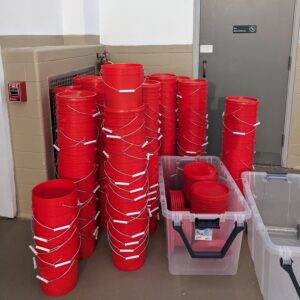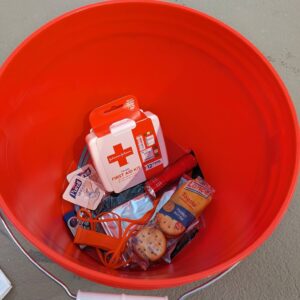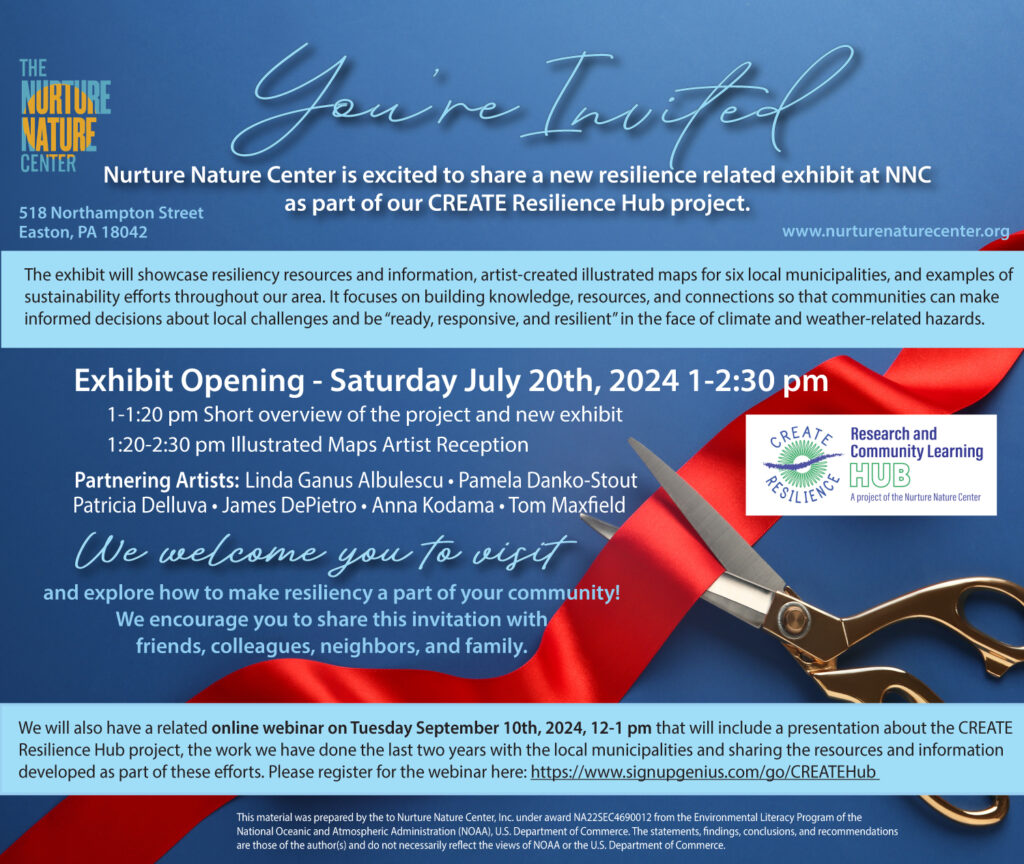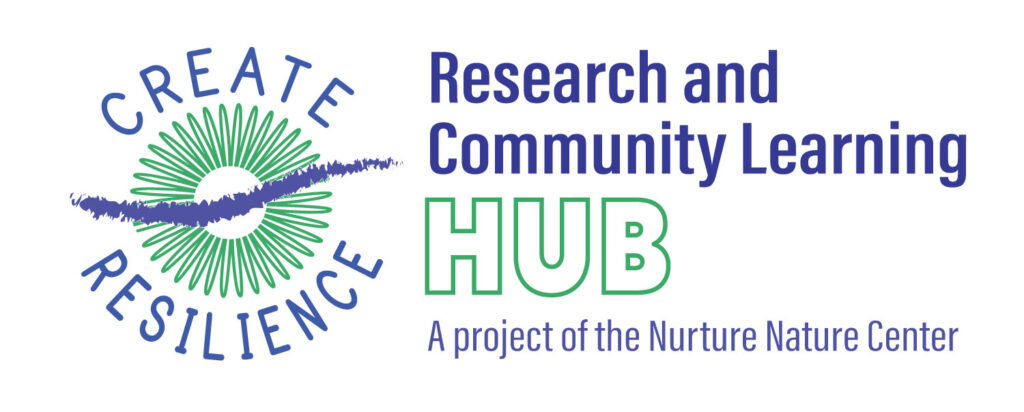 As we reach the end of our two year CREATE Resilience Hub project, we wanted to take the opportunity to highlight some of the resources the project made available to local governments and communities, many of which will remain available as part of an in-person exhibit at NNC and a digital resource hub. The CREATE Resilience Research and Community Learning Hub, funded through a Community Project Funding request supported by Congresswoman Susan Wild and administered by NOAA, advanced the work started in our original CREATE Resilience project. It focused on building knowledge, resources, and connections so that communities can make informed decisions about local challenges and be “ready, responsive, and resilient” in the face of climate and weather-related hazards.
As we reach the end of our two year CREATE Resilience Hub project, we wanted to take the opportunity to highlight some of the resources the project made available to local governments and communities, many of which will remain available as part of an in-person exhibit at NNC and a digital resource hub. The CREATE Resilience Research and Community Learning Hub, funded through a Community Project Funding request supported by Congresswoman Susan Wild and administered by NOAA, advanced the work started in our original CREATE Resilience project. It focused on building knowledge, resources, and connections so that communities can make informed decisions about local challenges and be “ready, responsive, and resilient” in the face of climate and weather-related hazards.
In the first year of the project NNC provided educational webinars to local municipal leaders, hosted 10 high school interns that interviewed local partners to support research on the municipalities, and developed resiliency plan templates for municipal partners to completed related to hazards, assets, goals, and actions. We also created interactive online maps that allow community members to provide input on hazards and assets in their municipality.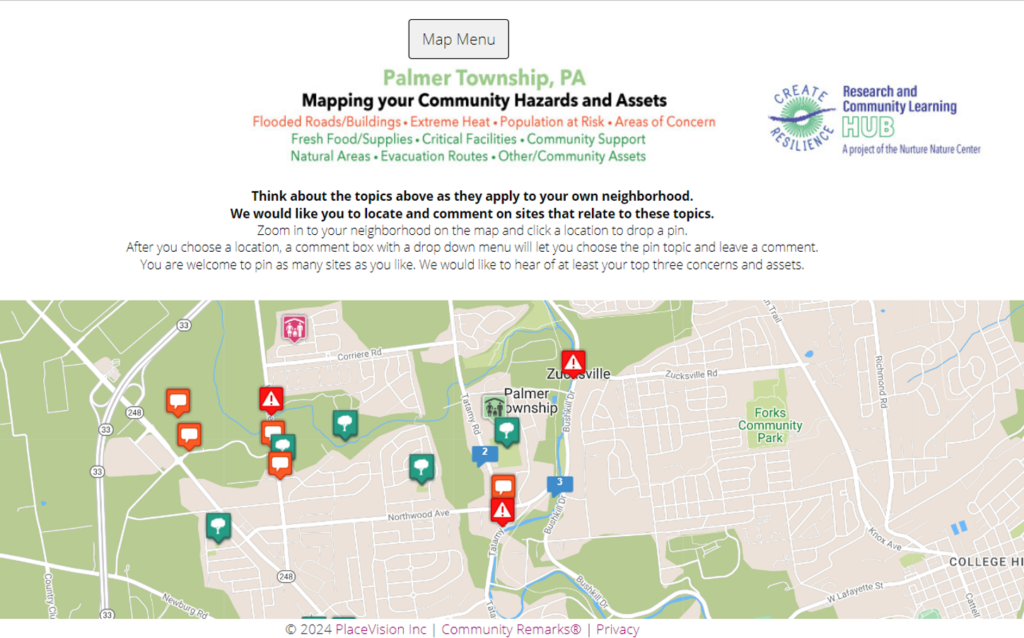
Hanover Township – https://communityremarks.com/hanoverpa/
Upper Nazareth Township – https://communityremarks.com/uppernazpa/
Borough of Portland – https://communityremarks.com/portlandpa/
Palmer Township – https://communityremarks.com/palmerpa/
East Allen Township/Borough of Bath – https://communityremarks.com/allenpa/
Bushkill Township – https://communityremarks.com/bushkillpa/
In the past month, NNC staff presented a summary of the project to our partner municipalities including Palmer Township, Portland Borough, East Allen Township, the Borough of Bath, Hanover Township, Upper Nazareth Township, and Bushkill Township. We delivered emergency preparedness kits, an illustrated map, and a draft regional resiliency plan to each local government to support their resiliency planning and education efforts.
Emergency Preparedness Kits
We distributed over 400 emergency preparedness kits as part of this project. Each consists of a red bucket with some basic items to have on hand in an emergency – a flashlight, first aid kit, can opener, emergency blanket, non-perishable food items, etc. – and information on what individuals and families can add to the kit to complete it. Every household’s needs will be slightly different, potentially including things like medication, pet food, items for children or elderly family members, and more.
Illustrated Maps
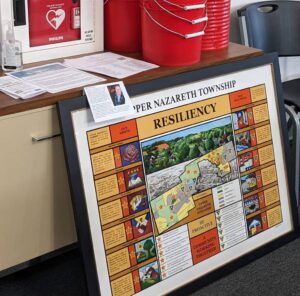 As part of the Hub project, NNC connected each partner municipality to a local artist who created a a unique illustrated map of each community depicting their hazards, challenges, assets, and community priorities. Artists met with local officials and residents at a forum earlier this year to learn more about each municipality and what was important to represent in the map. Each community received a framed version of the final map and a digital version, and the maps will also be displayed at Nurture Nature Center as part of the CREATE Resilience Hub exhibit opening on Saturday, July 20th at 1pm.
As part of the Hub project, NNC connected each partner municipality to a local artist who created a a unique illustrated map of each community depicting their hazards, challenges, assets, and community priorities. Artists met with local officials and residents at a forum earlier this year to learn more about each municipality and what was important to represent in the map. Each community received a framed version of the final map and a digital version, and the maps will also be displayed at Nurture Nature Center as part of the CREATE Resilience Hub exhibit opening on Saturday, July 20th at 1pm.
Partnering artists included: Pam Danko-Stout, Pat Delluva, Jim DePietro, Linda Ganus Albulescu, Anna Kodama, and Tom Maxfield.
Regional Resiliency Plan
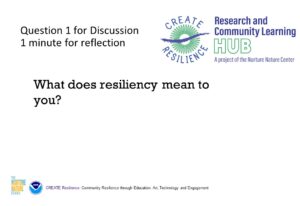 Based on input from partnering municipalities (both feedback from local residents and municipal staff/officials), the Lehigh Valley Hazard Mitigation Plan, research from high school interns that interviewed local partners, and scientific research on hazard and climate impacts in Pennsylvania, NNC drafted a plan that addresses hazards and actions through a focus on leveraging community assets in the Lehigh Valley region. We also encouraged partnering municipalities to adapt the plan to their specific context by providing additional localized hazard impacts and planned resiliency actions that we included as appendices to the regional plan. This plan will be available on our digital resource hub so that other communities can use it as a starting point and adapt it to meet their needs.
Based on input from partnering municipalities (both feedback from local residents and municipal staff/officials), the Lehigh Valley Hazard Mitigation Plan, research from high school interns that interviewed local partners, and scientific research on hazard and climate impacts in Pennsylvania, NNC drafted a plan that addresses hazards and actions through a focus on leveraging community assets in the Lehigh Valley region. We also encouraged partnering municipalities to adapt the plan to their specific context by providing additional localized hazard impacts and planned resiliency actions that we included as appendices to the regional plan. This plan will be available on our digital resource hub so that other communities can use it as a starting point and adapt it to meet their needs.
Even as the funding for the CREATE Resilience Hub concludes in a couple of months, NNC, our municipal partners, and communities throughout the Lehigh Valley will continue to make use of the resources created through the project to enhance resiliency efforts in our region. We invite everyone to join us for the in-person exhibit opening on Saturday, July 20 at 1pm (see details below), and to keep an eye out for the release of the digital resource hub soon! Even if you can’t visit the exhibit in person, you can contribute your ideas about resilience in your community through the survey here.
Understanding our region’s hazards; how they will be affected by climate change, development, and other patterns; and the assets we can use to respond are the initial steps in developing an effective plan to enhance our resiliency. Building resilience is an ongoing process that needs the involvement of individual citizens, businesses, local government, community organizations, and state and national partners.
Please register for our September 10th webinar about this project here: https://www.signupgenius.com/go/CREATEHub#/
This article was prepared by the Nurture Nature Center, Inc. under award NA22SEC4690012 from the Environmental Literacy Program of the National Oceanic and Atmospheric Administration (NOAA), U.S. Department of Commerce. The statements, findings, conclusions, and recommendations are those of the author(s) and do not necessarily reflect the views of NOAA or the U.S. Department of Commerce.

